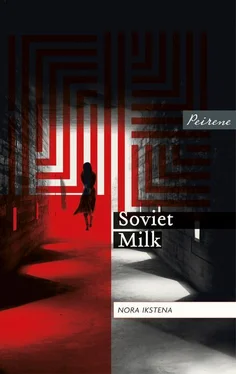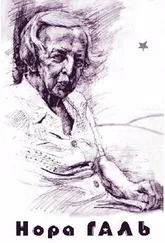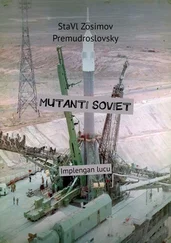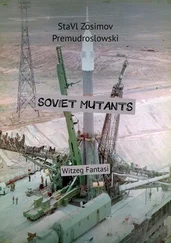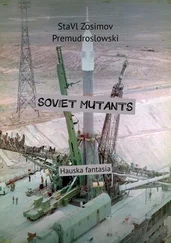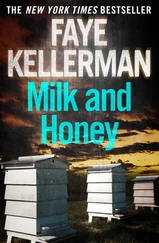‘Brave, you say? To eat his own children?’ I cried inconsolably, struggling with the feelings of hate and love that were tearing me apart.
‘By brave I meant his determination for freedom,’ my mother said. ‘Let’s go and bury Bambi.’
My crying slowly calmed. We left the dog in the room and went out into the budding garden. Where, then? Under the jasmine or the apple tree, or simply by the fence for his sinful deed?
‘You must forgive the dead,’ said my mother. She took a spade and dug a small hole under the apple tree. I covered it with anemones and laid Bambi there. The white hamster lay among white flowers. Two strokes of the spade and he disappeared from our eyes, merging with the fragrant, black soil.
My mother lit a cigarette and for a while we lingered by Bambi’s grave.
‘But why did he eat his children?’ I asked my mother.
‘Probably he was saving them from being caged,’ Mother said, and hugged me tightly. She was trembling all over, and her heart was beating violently. I hugged her back equally tightly. For a moment we stayed there. The aroma of the freshly dug soil mingled with the smell of cigarette smoke. Somewhere in the distance a nightingale twittered. Soon the cherries would blossom.
*
My tiny consulting room was slowly suffocating me. My patients multiplied. They circulated information about me and drove to see me from ever more distant regions, armed with flowers, boxes of sweets and fresh farm food. The overseers had forgotten about me, thinking that I was harmless in this far-flung place and that the penalty for my Leningrad ‘crime’ was severe enough.
My former city colleagues didn’t seem to care how I was. In fact, they were afraid to show they cared and so risk ruining their blossoming and well-paid careers, now supplemented by trips to friendly USSR countries and even to the rotting West. They all knew that the penalty for contact with me would be a visit to the infamous corner building with its KGB overseers, its prison cells and pre-deportation holding tanks. Freedom had been dangled before me in the form of studies in Leningrad. I hadn’t known how to deal with it. For this I’d been sent into exile in this stifling room at the ambulatory centre.
I had succeeded with my Serafima experiment several times. Women who couldn’t get pregnant followed my instructions, brought me their husband’s sperm, and the miracle, as they called it, happened. In their eyes, I became a miracle worker. But there was no miracle in this, just a casual, lucky happenstance, to which I lent my hand and some of the medical tricks I knew. Somehow, this tempered my sense of humiliation. It added up to more than the daily round of gynaecological examinations and diagnoses which I could do with such precision and ease that it felt like a game of patience. I shook a mental fist at the head doctor, who, in his gloomiest dreams, could never have envisaged that I, the exile, could repeat something like this.
Still, it’s possible that exile saved me. I had experienced the death of only one patient. Had I remained in the meat-grinder that was Riga, I would have had to accept that patients’ deaths are normal. An unavoidable medical statistic. I do remember the senselessness of that one death. The woman’s labour pains had been dragging on, which in itself was not unusual. She was exhausted. Her pulse was weak and the baby’s heartbeats ever fainter. I made the decision to do a caesarean section. In the operating room I was assisted by a student who still had much to learn. The anaesthesia took effect well. I did the section and took out a healthy, strong baby boy. I still needed to stitch the wound closed. I signalled to the student with my head that his help was no longer needed. Then, as I looked on, the student took his gloves off over the woman’s open womb, and all the sweat-covered talc that was inside the gloves fell into the wound.
He stood there wide-eyed as the talc mixed with the woman’s blood, stunned by what he had done. I threw myself at the wound, trying to clean it, but there was little that could be done to save the situation. Although the woman immediately received doses of antibiotics, after a few days she was diagnosed with a septic infection and a generalized poisoning. We didn’t succeed in saving her. The head doctor wrote up the case as an accidental death, because the student was the son of a very good friend of his, a high-ranking official. Before me unfolded the great scientific road to Leningrad. That night I created a chilling scene for my family at home. I swallowed sedatives with my vodka, then locked myself in the bathroom and howled.
Here, in the quiet countryside, I had a strange dreammany times over. I was standing in an empty field. Two women approached me. I recognized them: one was Serafima, the other was the dead woman. Serafima came to me and said that she was not alive. The dead woman said she was the one who was alive. I stood there, confused, not knowing what to say. The alive one was dead, the dead one, alive. I woke drenched in sweat.
It was early morning. My daughter was quietly setting out dishes. She was getting ready for school. I smelled the delicious aroma of coffee. She was brewing it for me. It had been no more than a bad dream. The pain in my breast subsided.
*
As was our custom, I brought a large mug of coffee into my mother’s room, without sugar or milk.
‘I had a dreadful dream last night,’ she said. We weren’t accustomed to recounting our dreams to each other. Dreams were dreams; reality was reality.
The reality was this: we were alive. Mundane things shaped our days, the days became weeks, the weeks, months, the months, a year. They stuck together very much like the lumps of clay in our ceramics workshop, which I attended twice a week at the community centre. The fresh clay stood there in large blocks, wrapped in cellophane. It reminded me of the large block of butter that the storekeeper cut into small pieces with a wire much like the one that cut the clay. Our instructor was a sculptor who came from the city and, like my mother, always smelled of cigarettes and alcohol. As the workshop began, she would distribute wire-cut lumps of clay. She showed us various techniques: for example, how to fashion a clay box from a paper pattern. Yet we were free to knead and shape the clay as we saw fit. Follow your instincts, the instructor used to say, pulling her knobbly beret over one eye, wrapped in a piece of clothing she called a poncho and lighting up her next cigarette with relish. We followed her instructions.
In the beginning the clay was tough to knead. It resisted my fingers. Gradually it warmed, then became soft and malleable. I already had a couple of clay dishes with scalloped edges at home, also a squirrel and two medals with the inscription ‘Greetings on 8 March’, surrounded by appliquéd, colourfully glazed flowers. These were intended as a surprise for my mother and grandmother on International Women’s Day. But today I wanted to make something special.
In my mind’s eye, I saw my mother’s drawing. It was a vague memory. I tried to recall how the foetus looked inside a womb. Very like a large bean, yet with discernible human features. Somewhat curled up, drawn into itself. It wasn’t easy to shape. At first my foetus was just an indistinct mass. I kneaded it with my fingers, rolling it on the table, now stretching it, now compressing it. Seeing my confusion, the instructor asked me what I was trying to create. A baby still in her mother’s womb, I replied. She extinguished her cigarette and helped me to create a smooth, curved shape. ‘You don’t have to make a precise image,’ she said. But I wanted to create it exactly as my mother’s precise drawing appeared in my memory. Now the head was turning out too big, and the arms and legs were too spindly and small.
Читать дальше
